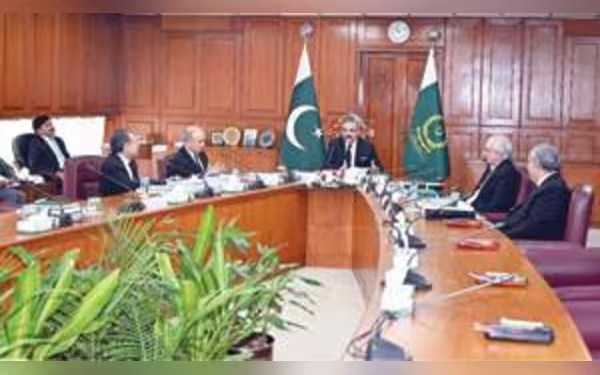Saturday, November 16, 2024 07:55 PM
SJC Expands Consultation on IHC Judges' Allegations
- SJC addresses IHC judges' serious allegations.
- Council to broaden consultation on judicial conduct.
- Judicial Commission forms Constitutional Bench in Sindh.
 Image Credits: nation_pk
Image Credits: nation_pkSJC expands consultation on IHC judges' allegations, addressing judicial conduct and forming a Constitutional Bench in Sindh.
The Supreme Judicial Council (SJC) of Pakistan has recently taken significant steps to address the concerns raised by six judges of the Islamabad High Court (IHC). These judges have accused intelligence agency personnel of meddling in judicial matters, a serious allegation that has sparked widespread discussion. In a meeting chaired by Chief Justice of Pakistan Yahya Afridi, the SJC decided to broaden the consultation process regarding this letter, indicating the gravity of the situation.
During the meeting, which took place on a Friday, several prominent justices were present, including Justice Mansoor Ali Shah and Justice Munib Akhtar. The Council discussed various agenda items, particularly focusing on potential amendments to the code of conduct for judges as outlined in Article 209(8) of the Constitution. The SJC recognized that the code applies not only to judges but also to heads of various institutions, thus necessitating a wider consultation.
In addition to discussing the judges' letter, the SJC also addressed the establishment of its Secretariat and the rule-making process. The Council agreed to initiate this process and to present a draft in the next meeting. Furthermore, the Chairman was authorized to hire a qualified individual to serve as Secretary of the Council for three months. This person will assist in conducting meetings, overseeing the rule-making exercise, and ensuring that the Council's infrastructure and human resource needs are met.
In a decisive move, the SJC reviewed ten complaints against judges filed under Article 209 of the Constitution. After careful consideration, the Council found that the complainants had not provided substantial evidence to support their claims, leading to the dismissal of these complaints. The SJC has also committed to holding regular monthly meetings in the future to address any backlog of cases swiftly. Importantly, the Council warned that action would be taken against those who file frivolous complaints.
Meanwhile, the Judicial Commission of Pakistan (JCP) convened to discuss the formation of a Constitutional Bench within the Sindh High Court. This meeting was attended by various legal dignitaries, including the Chief Justice of the High Court of Sindh and several members of the National Assembly. After thorough discussions, the Commission unanimously agreed to nominate all existing judges of the High Court to serve on the Constitutional Benches. This arrangement aims to expedite the resolution of a significant backlog of cases and will remain in effect until November 24, 2024.
The recent actions taken by the SJC and JCP reflect a proactive approach to addressing judicial concerns and improving the efficiency of the legal system in Pakistan. As the Council continues to navigate these complex issues, it is crucial for the judiciary to maintain its independence and integrity. The ongoing dialogue and reforms will not only enhance public trust in the judicial system but also ensure that justice is served promptly and fairly. The developments in this area are worth monitoring, as they will undoubtedly shape the future of Pakistan's legal landscape.













